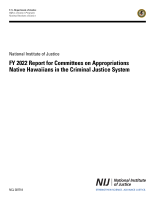The Impact of Neighborhood Status on Imprisonment for Firearm Offenses
Journal
Journal of Contemporary Criminal Justice
Date Published
2016
Agencies
NIJ-Sponsored
Publication Type
Research (Applied/Empirical)



